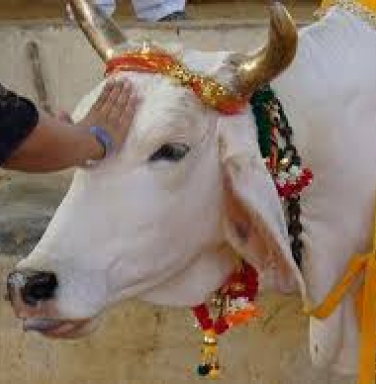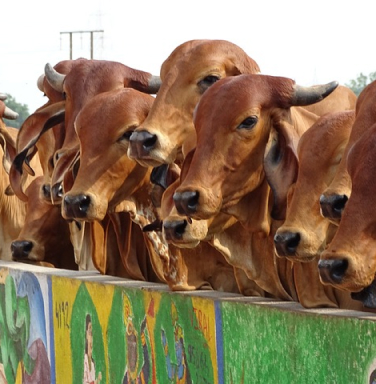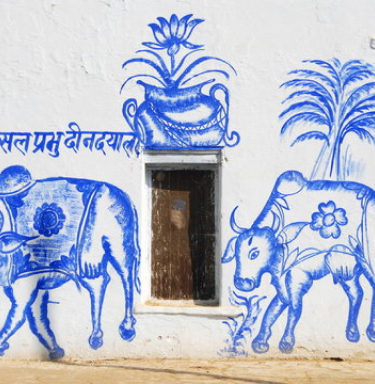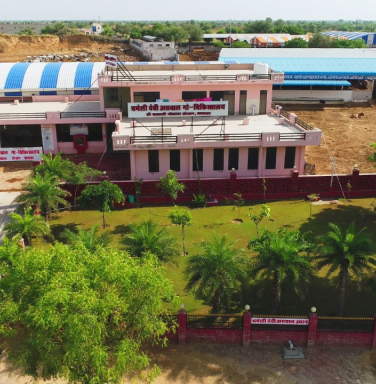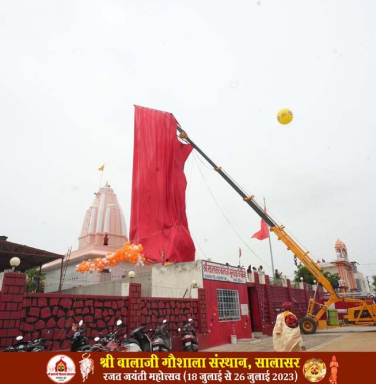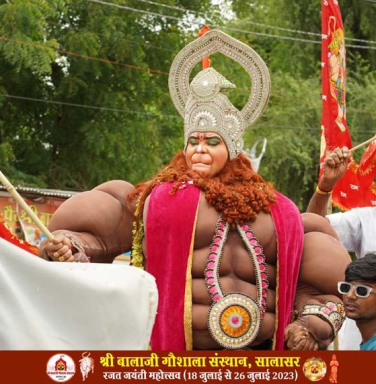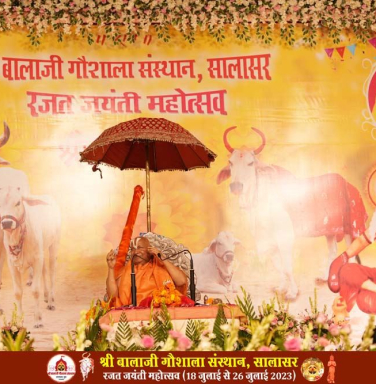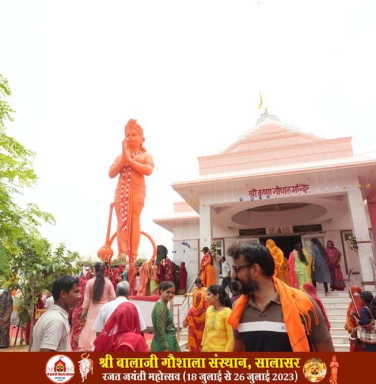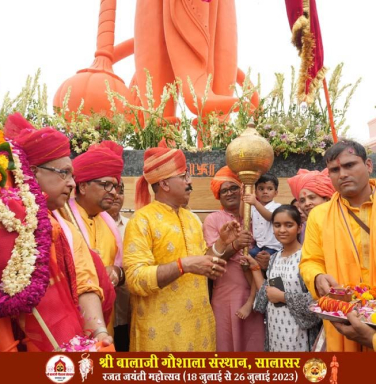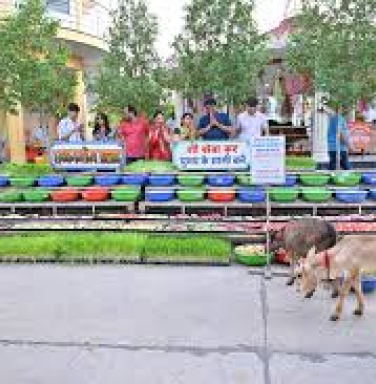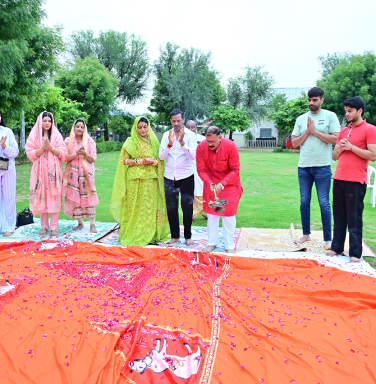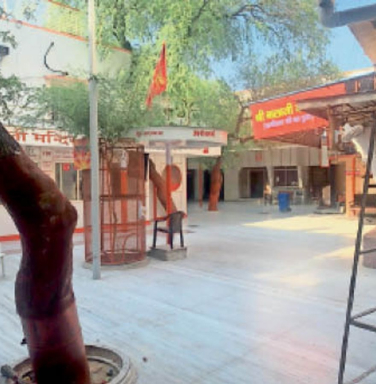Shri Balaji Gaushala Sansthan is located on National Highway 65 Sujangarh Road, one kilometer away from Shri Salasar Balaji Temple. This Gaushala was established on 23 July 1998 as per rituals. The Gaushala which has been developing progressively since its establishment, has received the status of Adarsh Gaushala of Bikaner Division by Rajasthan Gau Seva Aayog.
For the operation of Shri Balaji Gaushala Sansthan, a management committee of active and enlightened people is formed which discharges its duties responsibilities. Shri Balaji Temple, Shri Hanuman Seva Samiti, Gram Panchayat, villagers, priest family and religious donors have received unique support.
Krishna Gopal Temple
According to the Ramcharitmanas 1/192 composed by Goswami Tulsidas, the Lord incarnated on earth to protect cows, Brahmins, and dharma: “Vipra dhetu sur sant hit leena manuj avatar nij ichha nirmit tanu maya gun gopar.” While Lord Krishna conveyed the message of cow protection through his childhood pastimes, he also spoke of health benefits from Panchgavya and the path to liberation. Keeping this in mind, the Krishna Gopal Temple is symbolically located at the main entrance of the gaushala complex.
Gosharan Griha
In the gaushala complex, more than twenty gosharan homes have been constructed, providing shelter to cows of different ages and breeds, allowing them to live without fear. These gosharan homes are suitable for the cold, heat, and rainy seasons. Their construction is inspired by the gaushala officials and carried out by various builders. Considering the increasing number of cows, more resourceful gosharan homes are needed.
Nandi Griha
Currently, there are eight cow shelters, and the number of useless bulls and aged bulls is steadily increasing, which is becoming a major cause of accidents in markets and on roads. It is also necessary to provide protection to them in nearby cow shelters, but the lack of sufficient space for cow shelters makes the task very risky. Separate compartments according to age groups are necessary in the premises. A humble request for construction.
Chara Griha
Large hay barns have been constructed for the storage of grass and feed used for cattle throughout the year. However, more barns are needed for adequate storage. Construction is required.
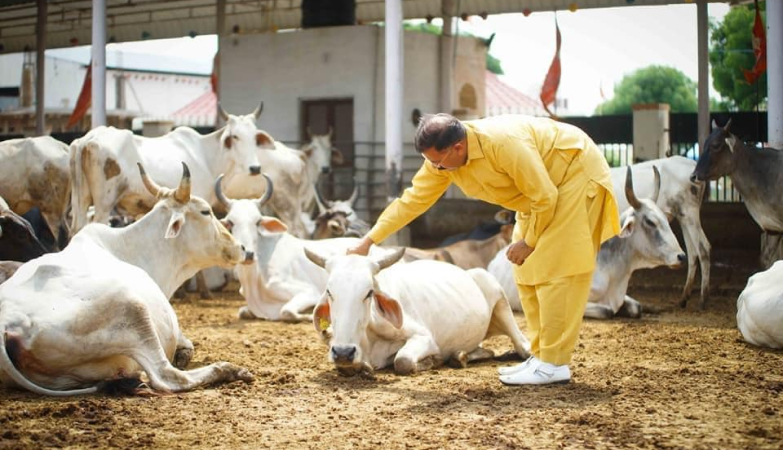
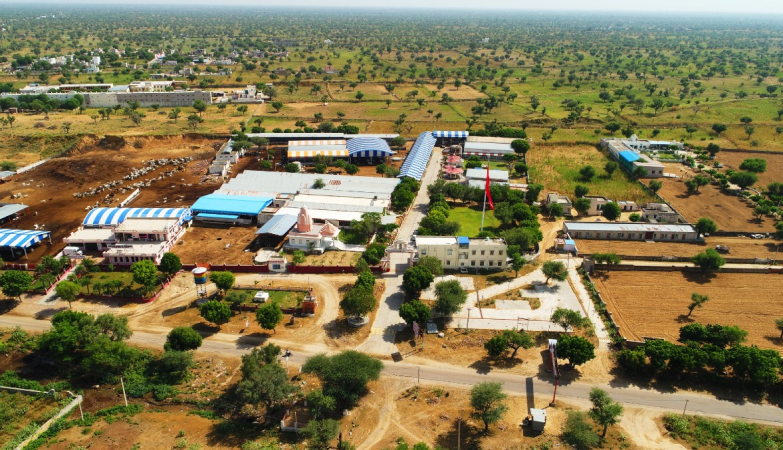
Chaar Diwali
A complete boundary wall has not been constructed around the institution and the agricultural lands of the cow shelter. This increases the possibility of theft and damage to crops by other animals. Therefore, the construction of a boundary wall is required for complete security. A request to donors and builders for construction.
Gau Sevak Residence
The staff residence is built in the gaushala, but due to insufficient accommodation for gau sevaks, on one hand, gau sevaks are unable to dedicate full time, and on the other hand, the labor of gausevaks coming from their villages goes to waste. Therefore, it is expected that sufficient accommodation will be constructed.
Kitchen
A large kitchen is required for the preparation of food such as cereal, dalia, chapati, and other nutritious food for the cattle. Currently, the constructed kitchen is small, so the construction of a larger kitchen will allow for the preparation of food in larger quantities at once.
Construction Hall
There is a great need for separate buildings for various types of taste and medicinal halls. Currently, vermicompost production is low and sales are in the initial stages. After the construction of the building, production can be increased. With a grand construction hall, on one hand, the cow dung, cow urine, leather, hooves, horns, etc. of the cattle will be utilized, while on the other hand, the gaushala can be made self-sufficient with fertilizers and medicines.
Biogas and Solar Plant
Considering the high electricity costs, there is a 35 kV solar energy plant in the gaushala which has provided significant relief in electricity. However, there is still a need to install another 35 kV panel here to achieve self-sufficiency in electricity expenses. The importance of a biogas plant in modern resources is extremely necessary. Given the high fuel consumption in the gaushala for machines to make bread, porridge ovens, and the preparation of 56 offerings for cattle, as well as for the food of the caretakers, donors are requested to provide financial support to help complete this project of the gaushala.
Water Management
There is often a scarcity of water in this desert region, and if there is water, it is saline. The arrangement for fresh water is made by constructing large tanks and hoses for storing water transported by tankers from other locations. A grand RO plant has also been installed, but it cannot be considered sufficient. Therefore, it is necessary to construct a large well and build a tank, where a high-capacity RO can be installed to provide sweet and pure water to the cattle, protecting them from waterborne diseases and nourishing them. For visitors and cow shelter staff, there is a water temple near the cow shelter premises and main entrance, and refrigerators have been arranged for cool drinking water as needed. It is expected that devotees will inquire about any water management projects from the cow shelter and can provide water supply accordingly.
Medical Facility
The Jasmin Devi Agarwal Go-Hospital is operated within the Goshal complex. It was inaugurated by the Juna Peethadhishwar Acharya Maha Mandaleshwar Swami Avadheshanand Giri Ji Maharaj. This well-equipped hospital has provisions for disease diagnosis and surgeries, as well as ambulance services, and includes a general ward (dome) and cottage facilities under the department. There are also doctor and staff quarters available to ensure continuous medical services.
Weighing Facility
Located at the Goshal complex and towards the road is the Shri Salasar Balaji Mundra Weighbridge (Dharmakanta), which provides not only the Goshal but also the general public with the facility to weigh goods.
Cow Darshan Parikrama
The significance of cow worship along with the philosophy and parikrama of the cow lineage in Indian culture has been explained. Keeping this in mind, a road with a grill and bridge will be constructed for the cow darshan parikrama so that visitors can have the opportunity to perform cow darshan and parikrama. Therefore, cooperation is expected in this matter.
Cow Worship Site
Cow worship has been performed by the devotees of Dharma Nuragi on special occasions with rituals. In this regard, a beautiful cow worship site has been created at the heart of the gaushala, so that interested devotees can perform worship with their families under the guidance of a skilled priest.
Tuladana Home
The donation given by weighing one’s own weight is called Tuladana, which has been an ancient tradition in our country. The donation of coins and laddus is common. However, the special thing here is that there is a Tuladana site for donating rice, jaggery, etc. for the benefit of cattle. Those interested can donate their weight in the goshalas and earn merit.
Dairy Cow Donation
Although the main purpose of the goshalas is not to produce milk but to provide shelter to destitute cattle, there is a separate section for dairy cows to ensure the availability of pure milk. Research can be conducted to increase milk production in this section. By receiving such dairy cows as donations, new experiments can provide new directions to milk producers and farmers.
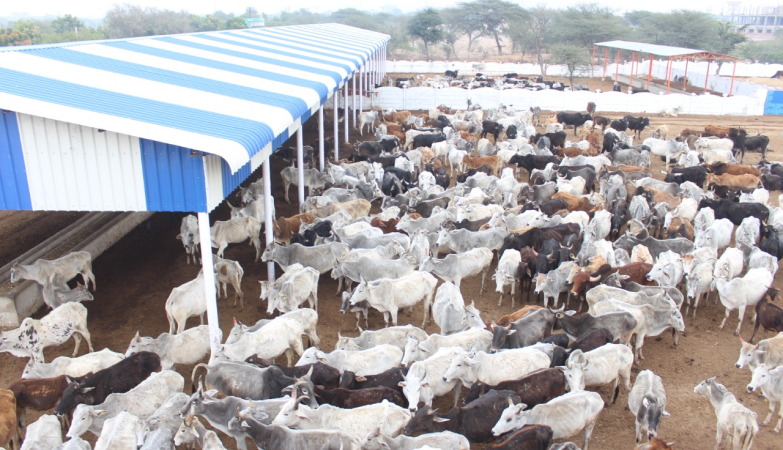
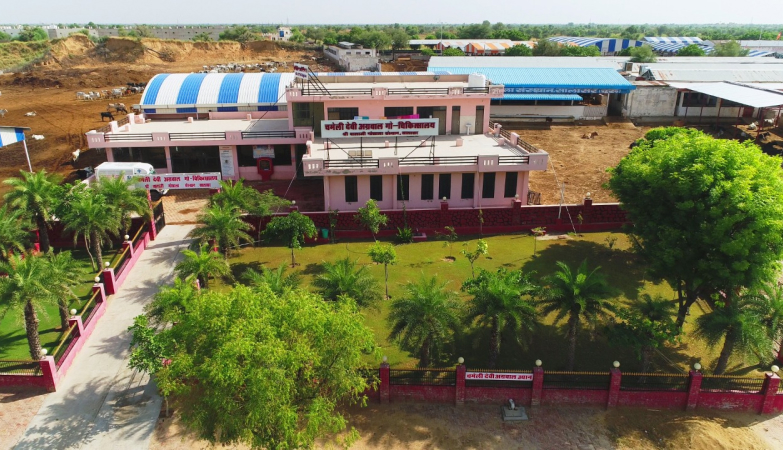
Breed Improvement
It has been observed that indigenous breeds are the best, but due to malnutrition and lack of care, the indigenous breeds have deteriorated the most. To improve the Gir and Tharparkar breeds, it is considered appropriate to use treated and improved bulls to impregnate cows for milk production enhancement.
Resting Place:
It is necessary to create resting places for the devotees visiting the cow shelter, where they can sit and peacefully contemplate and observe the cows. At this time, in a picturesque and pleasant environment, they can experience a new surge of energy while resting in the lap of Mother Cow, free from stress.
Welfare Yajna and Rituals
According to the belief that there are thirty-three crore deities in a cow, any ritual performed in the presence of Mother Cow is undoubtedly successful and prosperous. Therefore, those wishing to perform rituals can contact the cow shelter and arrange for knowledgeable priests to conduct Yajna rituals according to the scriptures to receive the desired fruits from Kamadhenu.
Tree Plantation
In addition to the goshala premises, there is a plan for tree plantation in Sigdola, Sevad Badi, Alsar, and Muradakiya agricultural farms to prepare tree cover so that cattle can rest in their natural shade and the area can be made green with a complete water supply. Medicinal trees and plants can benefit the medicine manufacturing unit. With sufficient water supply, grass can be produced for eight months in addition to the monsoon to nourish the cattle.
Land Donation and Cow Adoption Campaign
There are agricultural farms located at four sites, but fertile fields with good water sources can be purchased to fulfill the economic responsibility of land donation and cow adoption. Interested donors can contact the goshala officials for more information.
Cremation device for cattle
The disposal of dead cattle in the open often pollutes the environment, and burying them in the ground is not a very safe option either. Cremation is considered the best method, but it is extremely expensive. Therefore, the installation of electric cremation devices not only prevents environmental pollution but also allows for immediate cremation to take place.
Event organization on special occasions
For celebrating the birthdays, wedding anniversaries of oneself and relatives, or the death anniversaries of ancestors, arrangements can be made by contacting the cow shelter.
Regular Events
Keeping in mind the public sentiments, Krishna Janmashtami, Gopashtami, and Vatsavars are celebrated with great enthusiasm at the gaushala. Additionally, on every Amavasya, devotees of cows gather for donations. Similarly, our country’s national festivals, Independence Day and Republic Day, are celebrated with flag hoisting and enthusiasm. In the Shri Krishna Gopal temple located in the gaushala, morning and evening aartis are held, in which, apart from the staff, visitors also participate.
Grand Organization of Shrimad Bhagwat Katha
From October 3 to 9, 2015, a cow-related katha was organized at the gaushala. The main speaker of the katha, organized by the Prabhupremi Sangh, was the Juna Peethadhishwar Acharya Maha Mandaleshwar Swami Avadheshanand Giri Ji Maharaj, and a large number of listeners benefited.
Honors
The gaushala has been awarded more than 25 renowned certificates of honor both nationally and internationally. This includes two times by the British Parliament and two times by the Honorable Raj Bhavan in Jaipur, Rajasthan, through the Animal Husbandry Department as the ideal gaushala of the Bikaner division, and it has been honored with well-known certificates like QMS by ISO. This serves as a center of pride and inspiration for all gaushalas.
Solar and Biogas Plant
Considering the excessive electricity expenses, there is a 35 kV solar energy plant in the cow shelter which has provided significant relief in electricity for the shelter. However, there is still a need to install another 35 kV panel so that the cow shelter can achieve self-sufficiency in electricity expenses. The importance of a biogas plant in modern resources is extremely essential, such as for the roti-making machine, porridge oven, and the preparation of 56 types of offerings for cattle, and considering the high fuel consumption for cooking for the caretakers, donors are requested to provide financial support to help complete this project for the cow shelter.
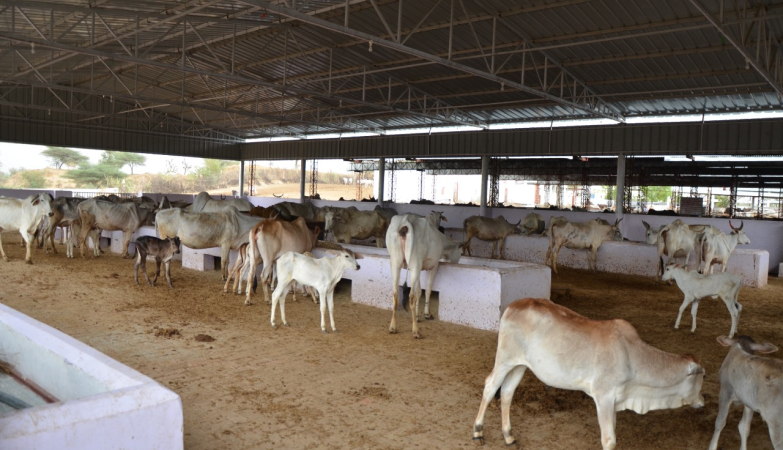
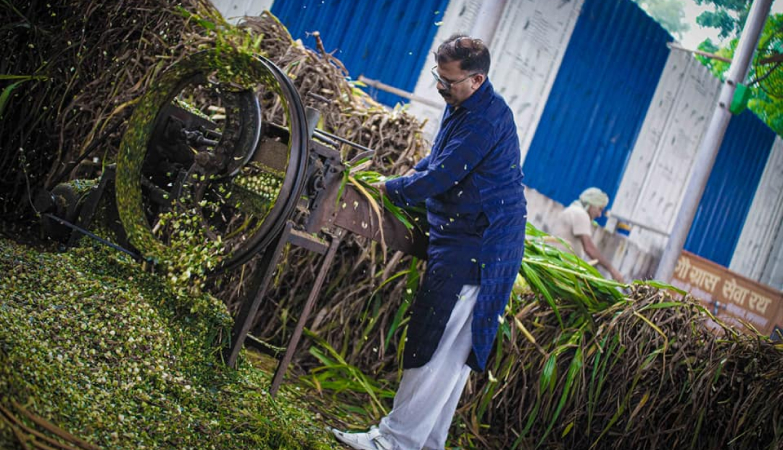
Organizing Shri Ram Katha
To celebrate the foundation day of Shri Balaji Gaushala Institute as the “Silver Jubilee Festival,” a nine-day Shri Ram Katha and Atirudra Hanuman Mahayagya is scheduled from July 18, 2023, to July 26, 2023. The main speaker for the Katha is Padma Vibhushan Tulsipithadhishwar Ramanandacharya Swami Shri Rambhadraacharya Ji Maharaj. Additionally, on July 18, 2023, a grand 51-foot tall idol of Shri Hanuman Ji Maharaj was unveiled by the revered Gurudev. In this sequence, a grand Bhajan Sandhya was organized on the foundation day, July 23, 2023, where renowned devotional singers from across the country presented their performances. 56
Offerings Prasad
In the Gaushala, 56 types of offerings are presented to the cow on occasions like birthdays, wedding anniversaries, and religious and social festivals, where 56 varieties of offerings are beautifully arranged and served to the cow.
CCTV Camera
The digital security dimension for the institution’s workplace activity is characterized by it. Approximately 50 CCTV cameras have been installed to monitor the gaushala premises from the office at every moment, ensuring safety.
Panchgavya Products
Products such as cow’s milk, curd, ghee, cow urine extract, cow dung manure, earthworm manure, cow dung incense sticks (which include cow dung, cow urine extract, and cow ghee), gonail, and cow dung cakes have been introduced to benefit the general public, and a distribution system has been established for these products produced in a completely healthy manner in the Panchgavya building. The manure derived from cow urine extract and earthworm manure is widely used in this area as a miraculous pesticide and fertilizer for plants.
Cow Dung Cake Machine
Cow dung has been deemed important in scriptures, and a plant has been set up for making cow dung cakes, which are power plants and serve a useful purpose. The cow dung cakes made from these are used in daily life for rituals, incense burning, Holika Dahan, and religious festivals.
Birds and Garden
A mini zoo ‘Bird Vihar’ center has been established in the gaushala complex, which includes various types of animals and birds. During the day, the birds roam freely in the Vihar garden and rest at night in wire cages. The animals and birds include lovebirds, ducks, white pigeons, sparrows, Persian cats, monkeys, white mice, parrots, peacocks, rabbits, and others. Additionally, a birdhouse has been built at a height of 51 feet, where thousands of pigeons take shelter. In front of the Bird Vihar, a beautiful bird garden has been developed, equipped with swings, a slide, etc. In this context, artificial feeding houses and perches have been installed for other birds.
Green Fodder Production Plant
In the gaushala complex, three hydroponic fodder machines operate regularly with a production capacity of 270 trays per machine, yielding 10 kilograms of green fodder per tray, providing high-quality green fodder (green grass) daily to all cattle from a nutritional standpoint. A total of 9 quintals of green fodder is served to the cows daily from all three machines, with each machine producing 30 trays per day.
Cow Flag Pole
A flag of cow and Balaji Maharaj has been hoisted at a height of 101 feet in the gaushala complex. The tricolor is hoisted on national festivals.
Water Management
This area has a high salinity in groundwater. Therefore, a grand RO plant has been installed that produces drinking water at a rate of 7000 liters per hour, supplying water to all sports from the water storage tanks. During the rainy season, 10 large water ponds have been created to conserve water collected from the tin shed, which is a unique contribution by the organization towards environmental protection and drinking water management. By creating a recharge well, the excess rainwater collected in the gaushala during the rainy season is allowed to enter the ground, which is a unique effort in water conservation.
Environmental Protection
In this Thar desert, there is a severe lack of plants, and the Gaushala institution has made a unique contribution to the environment by planting thousands of plants in and around its premises. Every year, during the monsoon season, plants are planted and nurtured. An example of plant planting is presented at the Gaushala institution by creating Nandini Van in the name of the cow. To make Salasar green in the future, several locations have been secured for planting by fencing them, and your cooperation is expected.
Contact Us
Connect with the social accounts of Shri Balaji Gaushala Salasar and get every update
